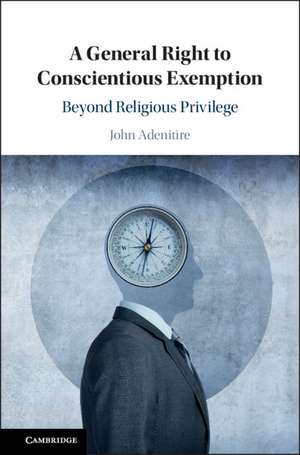A General Right to Conscientious Exemption: Beyond Religious Privilege
Autor John Adenitireen Limba Engleză Hardback – 15 iul 2020
Preț: 728.24 lei
Preț vechi: 846.79 lei
-14% Nou
Puncte Express: 1092
Preț estimativ în valută:
139.35€ • 145.49$ • 115.33£
139.35€ • 145.49$ • 115.33£
Carte tipărită la comandă
Livrare economică 04-18 aprilie
Preluare comenzi: 021 569.72.76
Specificații
ISBN-13: 9781108478458
ISBN-10: 110847845X
Pagini: 344
Dimensiuni: 158 x 236 x 25 mm
Greutate: 0.62 kg
Editura: Cambridge University Press
Colecția Cambridge University Press
Locul publicării:Cambridge, United Kingdom
ISBN-10: 110847845X
Pagini: 344
Dimensiuni: 158 x 236 x 25 mm
Greutate: 0.62 kg
Editura: Cambridge University Press
Colecția Cambridge University Press
Locul publicării:Cambridge, United Kingdom
Cuprins
1. Introduction; 2. The General Right to Conscientious Exemption in US Law; 3. The General Right to Conscientious Exemption in US Law: Beyond Religious Privilege? 4. The General Right to Conscientious Exemption in Canadian Law; 5. The General Right to Conscientious Exemption in Canadian Law: Beyond Religious Privilege?; 6. The General Right to Conscientious Exemption in UK Law; 7. The General Right to Conscientious Exemption in UK Law: Beyond Religious Privilege? 8. The Liberal Model of Conscientious Exemptions; 9. Balancing the General Right with Sexual Orientation Discrimination; 10. Conclusion.
Recenzii
'At a time when the highest courts in Canada, the United Kingdom, and the United States are all wrestling with the difficult contours of conscience rights, this book provides an invaluable panoramic view of the doctrinal landscape in each jurisdiction, along with a bold and incisive normative claim about the importance of extending exemption rights beyond religion in the modern liberal state.' Jim Oleske, Professor, Lewis and Clark Law School, Oregon
'In his important new book Adenitire shows that liberal democracies such as the UK, the US, and Canada have recognized a general but limited right of conscientious objection. He makes a strong case that this right to be exempted from ordinary law stems from the state's duty of neutral pluralism and is an essential characteristic of any liberal democratic society.' Richard Moon, Distinguished University Professor and Professor of Law, University of Windsor, Ontario
'Dr Adenitire's path-breaking and thought-provoking book provides the most methodologically rigorous defence of normative and interpretative claims to a qualified right to exemption from any legal obligation on conscientious grounds, not limited to religious matters, under the laws of liberal societies, including the current law of the USA, Canada, the ECHR and the UK. Its challenge to received opinion should be read by policy-makers, lawyers and political theorists.' David Feldman, Emeritus Rouse Ball Professor of English Law, Faculty of Law, University of Cambridge, and Emeritus Fellow, Downing College, Cambridge
'In his important new book Adenitire shows that liberal democracies such as the UK, the US, and Canada have recognized a general but limited right of conscientious objection. He makes a strong case that this right to be exempted from ordinary law stems from the state's duty of neutral pluralism and is an essential characteristic of any liberal democratic society.' Richard Moon, Distinguished University Professor and Professor of Law, University of Windsor, Ontario
'Dr Adenitire's path-breaking and thought-provoking book provides the most methodologically rigorous defence of normative and interpretative claims to a qualified right to exemption from any legal obligation on conscientious grounds, not limited to religious matters, under the laws of liberal societies, including the current law of the USA, Canada, the ECHR and the UK. Its challenge to received opinion should be read by policy-makers, lawyers and political theorists.' David Feldman, Emeritus Rouse Ball Professor of English Law, Faculty of Law, University of Cambridge, and Emeritus Fellow, Downing College, Cambridge
Notă biografică
Descriere
A sustained argument that a general right to conscientious exemption should be equally available to religious and non-religious objectors alike.
